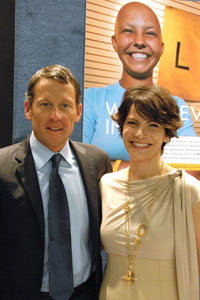Cancer research advocate highlights how genetic testing can empower us


Tracy Elliman was only 10 years old, but she understood that her grandmother had breast cancer—and that she was losing her fight.
“Then, as my grandmother was dying, my mother was diagnosed with Stage 3 breast cancer,” she recalls. “Even as a child, I knew that this was something that is completely out of the ordinary.”
In 2004, genetic testing at Christiana Care’s Helen F. Graham Cancer Center confirmed what Elliman and her mother had feared for years: Breast cancer ran in the family. Both women carry a BRCA1 gene mutation linked to breast and ovarian cancer.
By then, Elliman was married with two young children and living in Kennett Square, Pa. Testing empowered her with knowledge she could use to make decisions regarding her health. It also would ultimately lead her to become a nationally recognized advocate for cancer research.
For women who carry a BRCA1 gene mutation, the odds of developing breast cancer are 56–87 percent, compared to about 14 percent for women in the general population. For ovarian cancer, the risk is 16–44 percent, compared to 1.8 percent.
“Genetic testing doesn’t tell us when and where a person will develop cancer,” says Zohra Ali Khan-Catts, MS, CGC, director, Cancer Genetic Counseling. “It tells us that someone is at greater risk.” Ali Khan-Catts encouraged Elliman to explore clinical trials, including an ovarian cancer screening trial led by Mark E. Borowsky, M.D., director of Gynecologic Oncology at the Helen F. Graham Cancer Center.
“There are so many facets of genetic testing and counseling, and Zohra walked us through them all,” Elliman says. “I felt incredibly supported.”
After several years of heightened screenings, Elliman opted for prophylactic surgery. Her ovaries and tubes were removed in 2008. The following year, she underwent a bilateral mastectomy and breast reconstruction. Both surgeries were at Christiana Care.
“From the very beginning, I received a very high level of care from people who are genuinely concerned about me and my family,” she says. “So when it was time for surgery, it was an easy decision to go to Christiana Care, instead of Philadelphia or New York.”
“Tracy Elliman’s experience is an example of why individuals do not have to leave Delaware for their cancer care or cancer prevention,” says Nicholas J. Petrelli, M.D., Bank of America endowed medical director at the Helen F. Graham Cancer Center. “Services such as genetic counseling, gene testing and clinical trials are just a few of the supportive care options for patients at the Helen F. Graham Cancer Center.”
Elliman’s involvement with cancer research did not end with her surgeries. She became a passionate and eloquent advocate, raising money for FORCE (Facing Our Risk of Cancer Empowered), a group that supports families impacted by hereditary breast and ovarian cancer. In March, Elliman went to Washington, D.C., on behalf of the American Cancer Society Cancer Action Network to urge Congress not to make proposed cuts to cancer research. Her fellow speakers at the National Press Club were: Lance Armstrong, champion cyclist, cancer survivor and LIVESTRONG founder; Francis Collins, M.D., Ph.D, director, National Institutes of Health; and John Seffrin, ACS CAN chief executive.
Last year, she and her mother, Barbara Burd of Wilmington, spoke to congressional staffers about the importance of NIH funding, also on behalf of ACS CAN.
“I think of all the people who helped me, and I realize that no one should have to go through this alone,” she says. “Research and clinical trials are what is going to take us forward, and I will do whatever I can to support that goal.”